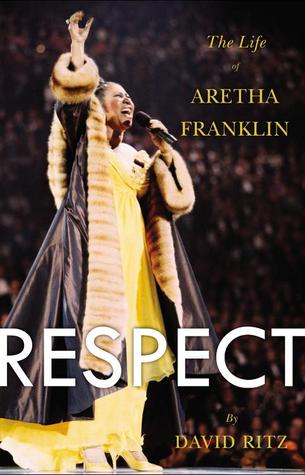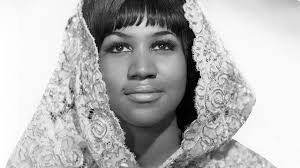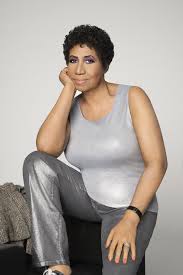Aretha Franklin (1995)
Aretha Franklin hates the new biography about her, “Respect” by David Ritz. She’s condemned it: “a very trashy book…full of lies and more lies about me.”
I didn’t hate it. It’s the best book yet about the Queen of Soul. That said, I’m kind of sorry I read it. Aretha comes off not as a bad person, just a not very likable one.
Ritz has already told Aretha’s life story once before. A prolific ghostwriter who specializes in autobiographies of the greats of rhythm & blues (Ray Charles, Marvin Gaye, Smokey Robinson, Etta James, etc.), Ritz collaborated with Aretha on her 1998 autobiography, “Aretha: From These Roots.” He wasn’t happy with it. Aretha insisted on presenting an idealized version of her life and the disappointing result was one of Ritz’s weakest efforts.
To make up for that compromised work, he’s now written “Respect,” a far more thorough, 500-page unauthorized biography that probes the parts of her life Aretha refuses to discuss, such as the death of her mother when she was 9; the birth of her first son at age 13 and her second at age 15 by different fathers; and her abusive first marriage. That’s just for starters. While Aretha’s temperamental ways are well-known, Ritz also dishes about her jealousy of other singers, from Roberta Flack, Natalie Cole and Whitney Houston to her own sisters, Erma and Carolyn; her egotism and diva-like mistreatment of family, friends and employees; and her refusal to admit to any imperfections in her life, either personal or professional.
No surprise that Aretha is appalled by Ritz’s book, which fails to treat the Queen with the dignity, deference and discretion she expects. She also may be angry that Ritz is diverting attention from her new record, “Aretha Sings the Great Diva Classics” (though this is something of a blessing in disguise. Sad to say, age has not been kind to the 72-year-old’s voice, which has thinned considerably. “The Great Diva Classics” is painful to listen to in places).
In her statement decrying “Respect,” Aretha claims Ritz is out for revenge. She says Ritz’s “actions are obviously vindictive because I edited out some crazy statements he had the gall to try and put in my book written 15 years ago. Evidently, he has been carrying this hatred ever since.”
I don’t believe this to be the case. I think Ritz loves Aretha. Or at least he loves her music. And he believes that an artist of her magnificence deserves to have her life and music examined honestly and in detail, flaws and all. I also think Aretha has a legitimate beef with Ritz’s book. It may not be vindictive, but its portrait veers negative. I suspect Ritz’s slant reflects his frustration in trying and failing to get Aretha to open up. Compensating – or perhaps overcompensating – for her reluctance to address touchy topics, he keys on Aretha’s flaws, foibles and personal tragedies. If there’s been joy in Aretha’s life, you won’t read about it in “Respect.”
Having interviewed Aretha twice myself, I empathize with Ritz. She is not an easy person to talk to. Our semi-awkward conversations didn’t yield the kind of zippy quotes journalists love. I worked hard to get her to loosen up and she never did. Which was okay. I was satisfied with the opportunity to quiz one of the supreme artists of the 20th century.
My first interview with Aretha in 1991 was in advance of her show at Great Woods in Mansfield, her first Boston area performance in nearly twenty years. I found her circumspect to an extreme. Here are the last two paragraphs of the story I wrote for the Boston Herald:
“…(I)f you’re looking for insight into the soul of Aretha Franklin, you won’t find it talking to her on the phone. You sense she wants to communicate, but, like a queen too long removed from everyday life, she doesn’t quite know how. Trained to be wary and on guard, she keeps her true feelings bottled up. Well, what does it matter, really? For millions of appreciative listeners, her emotions are no secret. They know Aretha tells all when she sings.”
Though still reserved, she spoke a bit more freely to me before her return to Boston for a concert at the Wang Center on Sunday, Oct 1, 1995. Re-reading the transcript of what she said that day, I can’t help but consider it through the prism of Ritz’s “Respect.” For example: Aretha was late calling me for this interview. She said she had been delayed. I believed her and didn’t think much of it at the time. But according to Ritz, this is typical inconsiderate behavior for a woman who has blown off numerous concerts and whole tours during her long career. He may be right, but I consider myself lucky that she called at all.
September, 1995
By phone from her home in Detroit
How are you today?
I just got in. We were in the thick of the traffic. There was an accident and it threw my day off.
Are you touring more now than you did in the ‘80s? The last time we spoke was four years ago when you played at Great Woods [June 19, 1991], which was the first show you’ve done in the Boston area in many years.
I was out there in the ‘80s too. I don’t think I’m doing more now, I think its about the same number of dates. But perhaps Boston, no. I hadn’t been driving that far.
I heard that you gave up smoking?
Yes, in 1991. It’s helped my voice, there’s no doubt about it. I should never have smoked. I started when I was around the age of 14. I can definitely tell the difference. I’m singing some notes I haven’t sung since I was 16. And my clarity has improved. Everything.
The last album you released [“What You See Is What You Sweat”] came out in 1991. Is there a reason you are not recording more frequently these days?
It’s a matter of timing, of gathering the right material and arranging the schedules of myself and my producers. It’s a matter of locking that all in. [Her next album, “A Rose Is Still A Rose,” would not appear until 1998.]
I’ve heard that there are plans for you to release a live album of your [1994] Carnegie Hall concert.
I produced that. Right now I’m just putting the final touches on that. But I don’t know if that will be the next release. That’s up to Arista and Clive Davis. But I’m absolutely pleased with what we have and with the fact that I produced it. I didn’t have to share the creative control. [The album was never released.]
I’ve also heard talk that you are going to make an album with your sons.
No. What I’m doing there, I have my own record company now, World Class Records. I’m the CEO. What I’m doing on that label, which will be distributed by Arista, I’m going to do family things on it. Recording my songs. Recording the family as a unit.
When do you think you’ll have your first release?
Probably in the spring of 1996. But I don’t know yet what it will be. [Aretha’s plans for her own record company did not come to fruition until the release of her “Woman Falling Out of Love” album in 2011 on her short-lived label, Aretha’s Records.]
What are your sons up to musically?
My youngest son, Kecalf [pronounced Kalf; the name is made up of the initials of his father, Ken E. Cunningham, and mother, Aretha Louise Franklin] is a hiphopper and a rapper. And my other son, Teddy [White Jr.], plays guitar. He plays in my band and he’s been doing some things lately with some musicians over in London. He sings, too, and he’s looking for his own record deal.
[In the above clip, note the disapproving looks mama Aretha throws her sons way]
Do the other boys [her older sons Clarence and Eddie] perform?
No.
Who will be on a family album?
Everyone. [No family album has been released.]
Do you like rap?
Some of it is okay, when it’s positive. Some of it is very rhythmic, some of it is melodic.
What about gangsta rap? Do you like any of it?
Negative rap, no, no no. I like positive rap only.
Does your son ever do raps you don’t approve of?
No. He’s positive, absolutely.
Last month I was lucky enough to see you sing at the Rock and Roll Hall of Fame concert in Cleveland. That was quite a show.
Wasn’t that a fabulous night! That was the first time I ever sang with Al Green. I really enjoyed that. I loved all of it. He was someone I thought it would be nice to sing with and when they told me he was going to be on the show, I said we should couple up and do something together. That was immediately to my liking.
[Al Green shows up at 5:00 to join the Queen for a high-energy ride down the “Freeway of Love”]
You’ve done so much in your career, are there mountains left for you to climb?
I’d like to do about four or five movies. I’m looking for that dynamite script. [Aretha had long harbored acting ambitions, eager to prove herself the equal of her diva peers Barbra Streisand, Diana Ross and Whitney Houston, but none of several planned film projects panned out. Her only movie roles came as the singing waitress in the two “Blues Brothers” movies.]
So you want to act?
Yes. I have one thing that’s on its way to me that I can’t talk about now. and I have another script from “NYPD Blue” that I’m going to be doing. I rather like that. I’m getting things. They’re coming in slowly, but they’re coming in. [Her NYPD Blues” cameo never happened.]
Speaking of Great Woods, there is something I want to mention to you. I had such a wonderful time there. It was one of highpoints of my career. Dynamite. They were so enthusiastic. But I read the next day leaving town that, according to this writer, that I only stayed on 45 or 50 minutes, which was absolutely untrue. I was so disappointed. Because I have never shortchanged my audience in my career. I sing as much for 10 people as I would for 10,000. My older brother [Vaughn], who is my road manager, gave me the time as an hour and 12 minutes and he said it as I walked off the stage. To read that silliness the next day in the paper is very disappointing. What concert were they at? My brother keeps time. I did the time I planned to do, which was an hour and 10 minutes, and I did two minutes more. [My research has failed to locate the review that irked Aretha. It did not appear in either the Boston Herald or Boston Globe. My mostly favorable review in the Herald noted that she performed for 75 minutes. It ended by noting something to interest Aretha trivia buffs: the “unimpressive” opening act was Faces, a quickly-forgotten vocal trio featuring Aretha’s son Eddie.]
What’s the show going to be like this time?
Oh, we’re doing a lot of new things and all of the hits. I think the band will be a 24, 25 piece orchestra and we’ll have a lot of beautiful surprises.
Do you have acting experience or do you just know you can do it?
It’s a practical next step in my career. I don’t have a coach or anything, but given the right part I could do a good job. It all depends on the role. On “NYPD Blue” the character I’ll play is a singer. I think I should know how to do that [laughs].
[Note that the man Aretha tells to “Think” is the great bluesman Matt “Guitar” Murphy]
Reflecting on your career, what is your proudest achievement? And what is your favorite album?
They’re like my children. I love them all.
According to music historians, your Columbia years were largely wasted and finally you took off thanks to Atlantic Records and [producer] Jerry Wexler. Do you see it that way?
I think it depends on the listener. I did some beautiful things at Columbia. They were not commercial, but artistically, I thought they were beautiful.
Do you think the Atlantic years were better than what you did at Arista?
That’s not true. The Atlantic years were special, absolutely. Those were the years that the music became commercial and was broadly accepted. They were very, very special years, the years that launched my career. And Atlantic was the launching pad. But that’s not to say that we haven’t done fabulous things at Arista. I absolutely love some of those things too. It really depends on the listener. Some of the things are just as good as what we did at Atlantic.
Do you think you were mishandled while you were at Columbia?
I don’t think so. They laid the groundwork beautifully. In terms of my career, it was the groundwork leading to the commercial things at Atlantic when I just took off. It was certainly a valuable time for me where I learned how things were done. How records are produced. The basics.
[One of the best tracks from Aretha’s Columbia years is her version of Johnny Mercer and Hoagy Carmichael’s “Skylark.” Watch her sublime live performance on an unknown (at least by me) ’60s TV show.]
I know you have some other projects in the works. One thing I heard was that you’re going to have a cooking video.
That is something I’m going to do in 1996 for Crown, which is the name of my production company. Switchin’ in the kitchen [laughs]. I’ll show people how to cook the best of soul. Ribs, chicken in dressing with candied sweets, greens, the best of soul cuisine. Hot water corn bread. I love to cook, absolutely love it. [No Aretha cookbook has appeared to date.]
I’ve also heard that you are going to be writing an autobiography.
I’m going to start writing that in October and it should be on the shelves next year. I’m collaborating on it with David Ritz.
Another thing I’ve heard is that you’re going to have a song appear on the soundtrack of a Whitney Houston movie?
“Waiting to Exhale.” I have a song [“It Hurts Like Hell”] written and produced by Kenny Edmonds, aka Babyface. He’s one of the best. There’s only one song on the soundtrack, but we’re working on more songs, enough for half of an album. And I’ll have a few things in there.
I’m one of many people who love your piano playing. Do you still play much?
Sure, I do it at home all the time. One day I’ll do an album where I’ll play, absolutely. I want to do more piano work. I’m going to do that and more things on piano in concert. [Aretha continues to play piano on a song or two in concert and on and song or two on her albums. But an entire album with her on piano? No.]
I hate to bring this up, but have you been able to resolve your tax problem with the IRS?
No, it’s no problem. It’s all been worked out. Now I can concentrate on the music.
[Aretha at the Antibes Jazz Festival in France in 1970. A scintillating 50-minute performance that gets better and better – and Lady Soul plays piano through most of it.]


